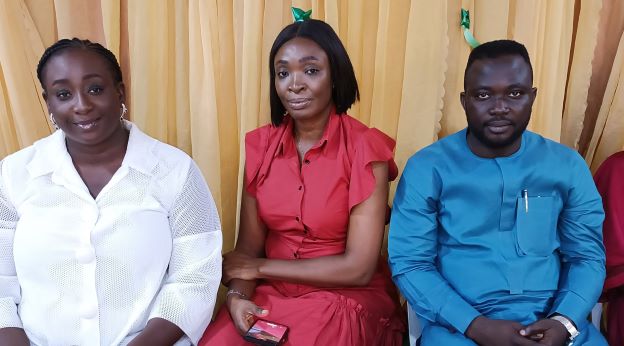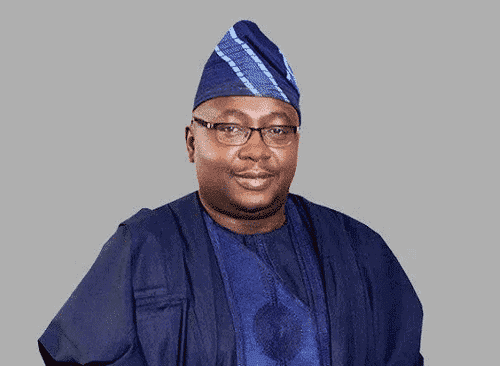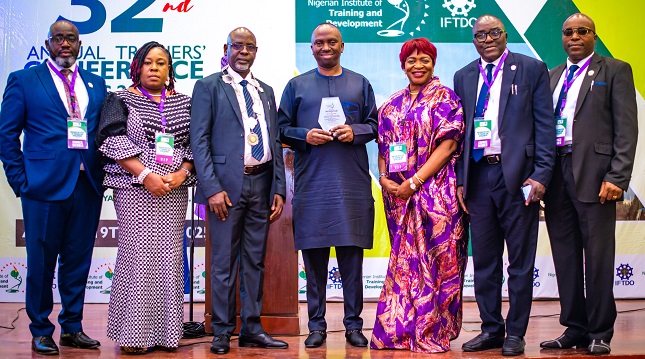News
NITDA Trains 335 Lagos Kids in Emerging Technologies

The National Information Technology Development Agency (NITDA) has empowered 335 kids in Lagos with skill in emerging technologies such as Robotics, Artificial intelligence, Coding, virtual Reality among other at the STEM Bootcamp for Kids (SB4KIDS).

Mallam Kashifu Inuwa, the Director General, NITDA in his goodwill message said that SB4KIDS is aimed at bridging the gap that currently exists in the educational sector.
He said that this Stem Bootcamp for Kids triggers NITDA’s interest and resonates deeply with the ongoing efforts toward implementing the National Digital economy policy for digital Nigeria.
Inuwa who was represented by Mrs Jumoke Alaka, Manager, South West Zonal office, NITDA, said that NITDA mandate is to create a framework for the planning, research, development, and standardization application, coordination, monitoring, evaluation and regulation of Information Technology practices in Nigeria.
According to him, “NITDA remains committed to supporting campaigns to diversify the country’s economy from a resource-based to a knowledge-based one through Information Technology (IT).
“We are indeed proud to be part of this event. It is my pleasure to introduce to you National Centre for Artificial Intelligence and Robotics (NCAIR), the arm of NITDA meant to drive R&D and innovation in the areas of emerging technologies.
“NCAIR is one of NITDA’s special purpose vehicles created to promote research and development on emerging technologies and their practical application in areas of Nigeria’s national interest,’’ he said.
He added that kids across spectrums of the society were trained on Coding, Artificial Intelligence, Robotics and Drone.As well as Digital Communications, Embedded Systems, the Internet of Things (IoT), Virtual Reality, and 3D requisite skill-set for the 4th Industrial Revolution.
The DG said that as an NCAIR’s catch-them-young initiative, the SB4KIDS is a Bootcamp to inspire young Nigerians in STEM.
He said that through the SB4Kids, NCAIR engages youngsters between the age of 8 and 16 years in an immersive and well-articulated Bootcamp.
According to him, “the bootcamp is meant to coach and inspire youngsters to imbibe STEM passion and create an early interest in digital and emerging technologies, that would hopefully shape the children future careers in these fields”.
He said that, NITDA SB4Kids is a yearly initiative conducted during the summer school holidays. And has trained over 200 participants which will broaden the minds of children in critical thinking and high sense of curiosity in science and digital technology.
He said that the early involvement of in technology and innovation would accelerate the development of the IT sector and create future leaders who will transform the Nigerian technology space and boost Nigerian Digital Economy.
Mr Mayowa Ajiboye, Partner, TEF Community Innovation Hub appreciated NITDA for bringing the training to Alimosho Local Government Area , a suburb of Lagos state where there are kids underserved in technology.
“NITDA through its subsidiary NCAIR thought it wise that during summer holidays children should kept busy by teaching them current technologies that are relevant in the 4th industrial revolution and the idea is to bring children together to teach them Science Technology Engineering and Mathematics (STEM).
“Locating this programme in Alimosho was significant in reaching children of less privilege in the society.
“The number that was totally trained were 335 children which was more than the number that was planned for. When we saw the number we decided not to drive them but to manage to accommodate every kid that shown interest.
“Because of the huge impact we saw that we extended the programme by one week to complement effort of the government. In spite of the fact that schools in Lagos State have resumed kids still continued to attend the training which shows that the programme has made its objective,” Ajibola said.
A total of 6 Laptops were given out. 3 laptops for the first 3 junior category and 3 for the first 3 senior category. All of them were also giving Arduino tool kits.
News
AfDB, Aerosense Ink Agreement to Propel Drone Adoption in Africa

The African Development Bank (AfDB) and Aerosense Inc, a Japanese drone manufacturer, have inked an agreement to expand cooperation and initiatives in drone technology in Africa.

According to the AfDB, representatives from both organisations signed a Letter of Intent late last week on the sidelines of the ninth Tokyo International Conference on African Development in Yokohama, Japan.
The agreement was signed by Solomon Quaynor, AfDB’s vice president for private sector, infrastructure, and industrialisation, and Kohtaro Sabe, Aerosense’s president and CEO.
In June, the AfDB Sustainable Road Maintenance Program for Africa issued a request for proposals, and the company was chosen.
The agreement formalises a relationship of mutual cooperation, assistance, information and knowledge sharing between the two institutions, as well as the exploration of co-financing and deal opportunities and appropriate coordination of actions between them and their respective teams, with a focus on the promotion of sustainable infrastructure solutions in Africa, according to the bank.
In addition, the AfDB will assist collaboration with the public sector, lead awareness-raising initiatives, support capacity building for local partners, and investigate potential debt (and/or equity) financing support for drone deployment projects.
Aerosense will conduct demand studies for drone solutions in specific African markets, as well as technical feasibility studies for drone application, taking into account local geographical factors, and investigate potential deployment options based on positive feasibility study results.
“The program is a bold response to Africa’s growing infrastructure challenges. By partnering with Aerosense, we will not only promote efficient road management but also consider promoting other unique solutions such as disaster management, river/flooding control, agricultural sensing, and medical equipment delivery,” said Quaynor.
For Sabe, the project is about leveraging multinational technological solutions to address African challenges.
He said: “It is a great honour to serve the people in Africa with our Japanese technology for enhancing their quality of life. We are looking forward to collaborating with AfDB to build a better future together in a concrete manner.”
News
Nigeria Taps $190M JICA Loan to Power Underserved Communities

Nigeria is seeking a $190 million renewable energy loan backed by the Japan International Cooperation Agency (JICA), according to Adebayo Adelabu, minister of power.

Minister Adebayo-Adelabu
In a statement released by the ministry on Saturday, Adelabu disclosed the plan during the 9th Tokyo International Conference on African Development (TICAD 9) in Yokohama, Japan, where the Nigerian delegation led by President Bola Tinubu held high-level discussions on power, infrastructure, and industrial transformation.
Adelabu said the facility is aimed at scaling distributed renewable energy solutions across underserved communities. “This builds on the recently launched $750 million World Bank Distributed Access through Renewable Energy Scale-up (DARES) programme under the Mission 300 Compact, which aims to bring clean and reliable electricity to more than 17 million Nigerians,” the ministry said.
The minister also held talks with Japanese corporations including Toshiba, Hitachi, Japan’s transmission and distribution corporation, and energy exchange corporations. Discussions focused on strengthening transmission infrastructure, improving operational efficiency, and cutting system losses.
The ministry said these engagements build on recent Federal Executive Council approvals for counterpart funding of N19.08 billion to unlock a $238 million loan from JICA. The loan will finance the expansion of the national grid, including the construction of over 200km of new 330kV and 132kV double circuit lines, six new substations, and extensions to existing facilities.
Three substations funded through a $32 million JICA grant—located in Apo (FCT), Keffi (Nasarawa), and Apapa (Lagos)—are also set for commissioning, a move expected to boost supply reliability for households, industries, and business hubs, including the Lagos Port.
Speaking during a panel session themed “HICKARE Africa: Harnessing Innovation, Co-creation, and Knowledge for Accessible and Resilient Energy for Africa”, Adelabu highlighted Nigeria’s energy gap, noting that only 55–60 percent of the population currently has access to electricity, much of which is unreliable.
He outlined the government’s approach to expand grid access in urban areas while accelerating off-grid solutions such as solar mini-grids and standalone systems in rural and peri-urban communities. He pointed to challenges including limited access to affordable capital, high costs for rural households, and the under-utilisation of productive-use equipment.
Despite these hurdles, the minister reaffirmed the government’s commitment to reforms through supportive policies, private-sector collaboration, and increased local manufacturing of renewable energy components.
Adelabu commended JICA and the Japanese government for their “long-standing support” to Nigeria’s power sector, praising their contributions to infrastructure, training, technical studies, and financing. He expressed optimism for deeper partnerships between both countries in driving Nigeria’s energy transition.
News
Banigbe, T2 CEO says Nigeria’s Growth Hinges on Learning, Innovation, and Afrocentric Content

Obafemi Banigbe, chief executive officer of T2, has stressed that Nigeria’s long-term economic transformation depends on continuous upskilling, digital learning, and workforce adaptability.

Speaking as Special Guest at the 32nd Annual Trainers’ Conference (ATC 2025) of the Nigerian Institute of Training and Development (NITAD), held recently at the Shehu Musa Yar’Adua Centre, Abuja, Banigbe warned that without deliberate investment in human capital and technology-driven innovation, the nation risks lagging behind in a rapidly evolving global economy.
Drawing from personal reflections, practical insights, and a forward-looking vision, Banigbe urged Nigerians to reimagine approaches to learning, work, and growth in order to build a prosperous, inclusive, and innovation-led society.
He emphasized that the traditional model of “learning once and working forever” is obsolete.
“With Nigeria projected to become the world’s third most populous nation by 2050, and 70 percent of its citizens under 30, the need for continuous upskilling, digital learning, and adaptability is not optional, it is existential,” he stated.
Banigbe underscored the importance of democratizing access to digital tools, ensuring that every Nigerian child has the same opportunities as peers in developed economies.
He called for the creation of Afrocentric educational content, including culturally relevant cartoons, to help children learn science, mathematics, and history through familiar cultural references rather than foreign identities that disconnect them from their environment.
He also urged a national shift away from a culture that prizes certificates and training hours to one that rewards competence, innovation, and problem-solving.
He envisioned a civil service and workforce driven by solutions rather than processes, stressing that while artificial intelligence may analyze and automate, it cannot dream, uphold ethics, or create new nations, a reminder of the enduring human advantage.
Banigbe further encouraged adoption of cost-effective training models such as online platforms, virtual cohorts, and open-source learning, while acknowledging the continued value of global exposure where local resources fall short.
During an interactive question and answer session, he addressed concerns around affordability, accessibility, and the role of self-driven digital education in shaping Nigeria’s future-ready workforce.
He assured participants that T2 itself is on a path of transformation, committed to delivering world-class services as a proudly Nigerian brand.
In recognition of his contribution to national dialogue and thought leadership, the President of NITAD, James Bulus, presented Banigbe with an Award of Excellence.

 E-Financial3 days ago
E-Financial3 days agoFBNQuest Merchant Bank Facilitates Landmark ₦5Bn Commercial Paper Programme for Accion Microfinance Bank

 E-Business3 days ago
E-Business3 days agoNDPC Begins Probe of Banks, Others for Data Breaches

 Telecom3 days ago
Telecom3 days agoDigital Realty Commits to Africa’s Digital Transformation @ Launch of LKK2 Data Center

 E-Financial3 days ago
E-Financial3 days agoUBA to Deepen Financial Inclusion, Boost Savings’ Culture with Super Savers’ Promo

 Telecom3 days ago
Telecom3 days agoIntel–U.S. Partnership Reshapes Semiconductor Landscape with Historic Equity Agreement

 E-Financial3 days ago
E-Financial3 days agoFidelity Bank Resumes Intl Transactions on Naira Debit Cards

 E-Financial3 days ago
E-Financial3 days agoNigeria Leads Africa in Stablecoin Adoption with $22Bn in Transactions

 Telecom3 days ago
Telecom3 days agoNITDA Alerts Nigerians to eSIM Security Flaw Deployed to Hijack Devices Worldwide



























